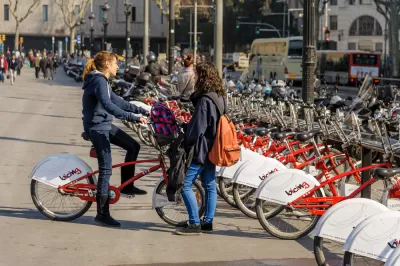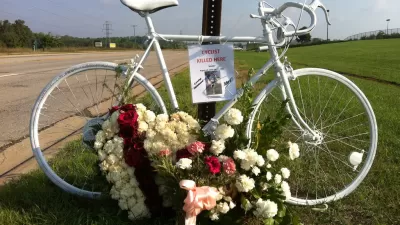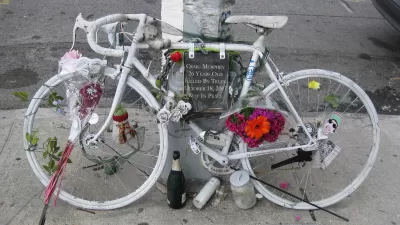In the United States, not a single bikeshare rider has died in an accident so far. A report from the Mineta Transportation Institute considers why bikeshare may be safer than conventional biking.

While regular cyclists contend with the very real possibility of fatal crashes as they navigate vehicular streets, bikeshare riders have so far been spared. That's not to say bikeshare users haven't been involved in accidents and injuries, but none have died in the United States since the first systems were deployed last decade.
Brad Plumer writes, "A new report [pdf] from the Mineta Transportation Institute sifts through data from bike-share systems in Washington, DC, San Francisco, and Minneapolis. They found that bike-share bikes had lower collision and injury rates than personal bikes in all three cities. In DC, the collision rate for bike share was 35 percent lower." Below are some of the reasons from the report that might explain this phenomenon.
- Bikes in bikeshare systems tend to be heavier, with wider tires and bright, noticeable colors
- Bikeshare usually operates in downtown areas where drivers are more alert to pedestrians and cyclists
- Riders tend to be less experienced, and thus more cautious
- Riders often lack helmets, which may encourage drivers to be more cautious as they pass
- While some have suggested that bikeshare promotes "safety in numbers," the report found no clear evidence of this (although separate findings have shown correlations in some areas between bike numbers and overall road safety)
FULL STORY: A new study looks at why bike share is so much safer than regular biking

Planetizen Federal Action Tracker
A weekly monitor of how Trump’s orders and actions are impacting planners and planning in America.

Map: Where Senate Republicans Want to Sell Your Public Lands
For public land advocates, the Senate Republicans’ proposal to sell millions of acres of public land in the West is “the biggest fight of their careers.”

Restaurant Patios Were a Pandemic Win — Why Were They so Hard to Keep?
Social distancing requirements and changes in travel patterns prompted cities to pilot new uses for street and sidewalk space. Then it got complicated.

Platform Pilsner: Vancouver Transit Agency Releases... a Beer?
TransLink will receive a portion of every sale of the four-pack.

Toronto Weighs Cheaper Transit, Parking Hikes for Major Events
Special event rates would take effect during large festivals, sports games and concerts to ‘discourage driving, manage congestion and free up space for transit.”

Berlin to Consider Car-Free Zone Larger Than Manhattan
The area bound by the 22-mile Ringbahn would still allow 12 uses of a private automobile per year per person, and several other exemptions.
Urban Design for Planners 1: Software Tools
This six-course series explores essential urban design concepts using open source software and equips planners with the tools they need to participate fully in the urban design process.
Planning for Universal Design
Learn the tools for implementing Universal Design in planning regulations.
Heyer Gruel & Associates PA
JM Goldson LLC
Custer County Colorado
City of Camden Redevelopment Agency
City of Astoria
Transportation Research & Education Center (TREC) at Portland State University
Camden Redevelopment Agency
City of Claremont
Municipality of Princeton (NJ)





























